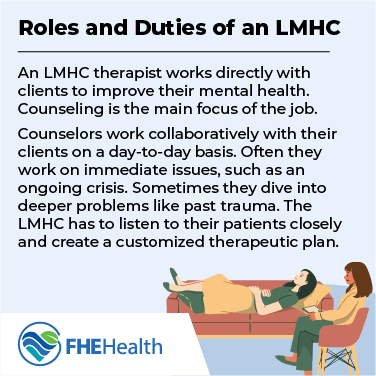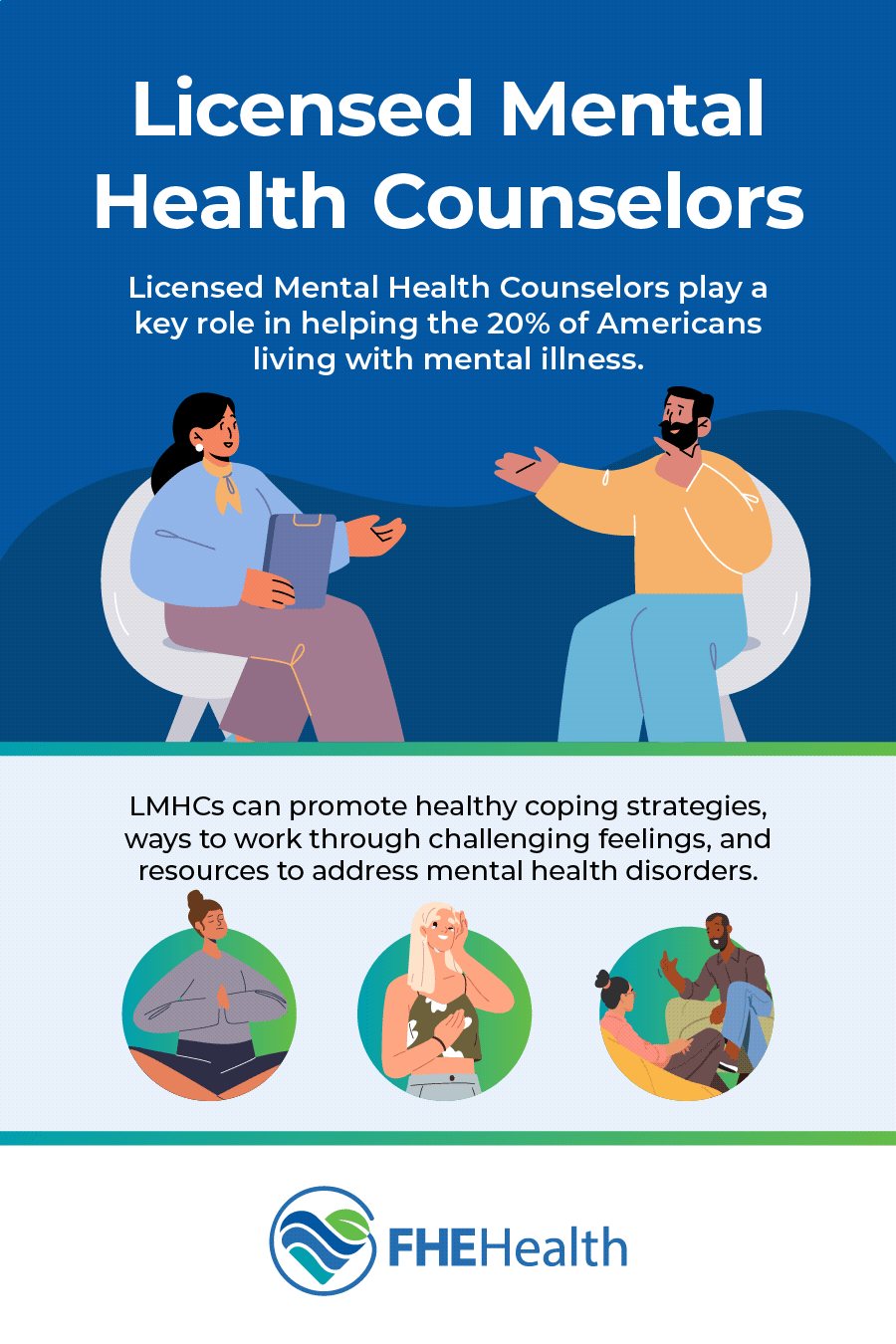
There are many kinds of mental health experts waiting to help the 20% of Americans living with mental illness. Among them are Licensed Mental Health Counselors or LMHCs. If you’re looking for mental health treatment or considering working in mental health, having an understanding of LMHC’s meaning can help you determine if a Licensed Mental Health Counselor is the right fit for your needs or if you’d enjoy a career in the field.
The Role of Therapists in Rehabilitation

In comprehensive treatment programs, both group and individual therapy play a significant role. Therapists work in both inpatient and outpatient capacities, helping patients identify issues and work through them in a safe, healthy way.
Therapists can have a variety of credentials. Some degrees and certifications therapists may hold include:
- Medical Doctor (MD). Psychiatrists are fully licensed and trained physicians who complete a minimum 3-year residency program in psychiatry following medical school. While many psychiatrists practice forms of talk therapy, others are more focused on the use of medications.
- Doctor of Psychology (PsyD). PsyDs are psychologists with doctorate degrees in psychology. However, this accreditation doesn’t necessarily indicate a particular field of practice. Some PsyDs practice in forensic psychology, while others work in a research capacity. PsyDs can hold other forms of licensure but are usually not required to do so.
- Licensed Professional Counselor (LPC). The Licensed Professional Counselor group encompasses many licensed mental health professionals, as licensure options vary greatly from one state to another. LPC certifications include Licensed Mental Health Counselor (LMHC), Licensed Clinical Professional Counselor (LCPC), Licensed Professional Clinical Counselor (LPCC) and Licensed Clinical Mental Health Counselor (LCMHC). Regardless of the specific acronym, these practitioners generally must hold at least a master’s degree in a counseling field and achieve passing scores on a licensing exam. Most LPC certifications also require anywhere from 1,000 to 3,000 hours of training before being permitted to practice independently.
- Licensed Marriage/Family Therapist. In some states, separate credentialing options are available for those who specialize in family or marriage counseling. Educational requirements are similar to those required of a Licensed Professional Counselor but may also be less.
- Licensed Clinical Social Worker (LCSW). Social work is a different field from counseling, but it’s closely related. Many social workers actively counsel clients, especially those who have legal or family issues related to mental health or addiction. LCSWs must have a degree in social work and meet exam and practice hour requirements.
What Is a Licensed Mental Health Counselor?
The involvement of LMHCs working as therapists in mental health treatment can promote healthy coping strategies, introduce new ways to work through challenging feelings and provide resources to address mental health disorders. Dr. Beau A. Nelson, DBH, LCSW, Chief Clinical Officer at FHE Health, says, “Research has shown that the relationship between the therapist and the patient is one of the most important factors in having a good experience in therapy. While qualifications and licensure are important, make sure to get a feel for if you feel safe and trust your therapist. Do they listen and communicate with you like you like? Does it feel helpful to talk to them? That will be important to discern in your first few visits
LMHC Meaning
As stated earlier, LMHC stands for Licensed Mental Health Counselor. The basic LMHC meaning is the job title used for LPCs in Florida and six other states. The training and education for LMHCs covers all types of mental health counseling, making them adaptable and knowledgeable therapists. While some specialize in a certain type of LMHC therapy, such as psychotherapy, others use a broad approach and adapt to specific clients.
To become an LMHC, students must master many topics within counseling, ranging from family therapy to addiction treatments. In both addiction and mental health treatment programs, LMHC is the gold standard. The National Clinical Mental Health Counseling Examination (NCMHCE) is thorough and complex, ensuring only those with the expertise and knowledge to succeed are granted this certification.
What Are the Roles and Duties of an LMHC?
An LMHC therapist works directly with clients to improve their mental health. Counseling is the main focus of the job. Some LMHCs work with a variety of patients, while others have specializations. They might provide general therapy for a specific population or mental health issue or concentrate on a particular method of therapy. You can tailor this job to the psychotherapeutic approach that interests you most.
Counselors work collaboratively with their clients on a day-to-day basis. They aim to build a trusted relationship and encourage clients to open up to them. They often work on immediate issues, such as an ongoing crisis. Sometimes they dive into deeper problems like past trauma. The LMHC has to listen to their patients closely and create a customized therapeutic plan for them.
Do LMHCs Prescribe Medication?
Medications can play an important role in treatment plans for mental health issues, but not all providers have the legal ability to prescribe them. An LMHC license doesn’t allow a mental health professional to prescribe drugs to clients. If an LMHC believes that a person may benefit from medication, they’ll typically refer them to a psychiatrist or another provider licensed to prescribe medications in their state.
What Is Certification Like for an LMHC?
Florida has specific education and licensing requirements for LMHCs. Some may not be required if you’re already licensed in another state or country, depending on their requirements.
Master’s Degree
LMHCs need a minimum of a master’s degree in mental health counseling or a related field from an accredited institution. They must have at least 60 semester or 80 quarter hours. There are also required courses that vary depending on whether your school is accredited by the Council for the Accreditation of Counseling and Related Educational Programs (CACREP).
Supervised Experience
After completion of a master’s degree, at least 2 years of supervised experience is required for LMHCs. They need to include at least 100 hours of supervision, 1,500 hours of face-to-face therapy work with clients and at least 1 hour of supervision every 2 weeks.
NCMHCE Exam
LMHCs in Florida must receive a passing grade on the NCMHCE exam. It’s a test developed by the National Board for Certified Counselors (NBCC) to determine practical skills.
Additional Training
Florida requires a 2-hour domestic violence course, an 8-hour laws and rules course and a 3-hour HIV/AIDS course.
What Jobs Can I Get as an LMHC Therapist?
LMHCs can work in a wide variety of counseling jobs. You can work for a practice or open your own. The following is just a small sample of possible careers.
- Marriage or divorce counseling
- Family therapy
- Addiction therapist
- Behavioral counselor
- School therapist
- Social worker
- Psychodynamic therapist
- Clinical psychology professor
Where Do LMHCs Work?
LMHCs work in a variety of settings. They can find employment in:
- Inpatient rehabilitation centers
- Outpatient mental health clinics
- Mental health practitioner groups and practices
- Hospitals
- Correctional facilities
Some states also allow LMHCs to establish their own private practices.
Where Are Mental Health Counselors Most in Demand?
The concentration of counselor jobs is higher in some areas than others, and due to the high concentration of jobs, demand for professionals to fill open positions may be greater in these places. As of 2023, the states with the highest concentrations of counselor jobs were:
- Massachusetts
- Colorado
- Connecticut
- Pennsylvania
- Virginia
Metropolitan areas with the highest concentration of counselor jobs included:
- Bloomington, IN
- Pueblo, CO
- Blacksburg-Christiansburg-Radford, VA
- New Bedford, MA
- East Stroudsburg, PA
- Altoona, PA
- Springfield, MA
- Lynchburg, VA
- Colorado Springs, CO
- Waterbury, C
What’s the Difference Between an LMHC and a Mental Health Therapist?
Mental health therapist is a broad term that can apply to any mental health practitioner who provides therapy services to clients. LMHC is a specific title given to mental health practitioners who receive certification or licensure in a state that uses the term. LMHCs are mental health therapists, but therapists can also be psychologists, social workers and other types of practitioners.
Is an LMHC a Good Job?
According to the U.S. Bureau of Labor Statistics (BLS), the need for behavioral disorder, mental health and substance abuse counselors is projected to grow 18% between 2023 and 2033. This is faster than the average growth predicted for all other occupations. Growing awareness and work to destigmatize mental health treatment is leading more people to seek counseling. States are also sending more offenders to mental health treatment rather than jail, increasing the need for counselors.
What Is the Average Salary of an LMHC?
The BLS states that the median salary for an LMHC in 2023 was $53,710 per year. However, it groups several types of counselors together, including those who only need a bachelor’s degree. LMHCs may earn more because they have more qualifications and licensing.
What Affects LMHC Salaries?
Salaries for LMHCs can vary depending on qualifications, work setting, area of specialty and hours. Geography is another key determiner of pay rates. In 2023, the top-paying states and territories for licensed mental health counselors had median salaries between $67,249 and $77,430 annually. Those states and territories were Alaska, Utah, the District of Columbia, New Jersey and New York.
Experience also impacts salary levels. Entry-level LMHCs typically earn less than those who’ve worked in the field for many years.
How to Find the Right LMHC as a Patient
Finding the right counselor starts with researching providers in your area. Conduct an internet search and make a list of LMHCs in your area. If you have insurance, contact your insurer to find out which counselors accept your plan. Then, get in touch with each LMHC on your list to learn more about them.
When evaluating counselors, consider past history. For example, a counselor experienced in juvenile counseling may not be as well qualified to address addiction issues. Those searching for counselors or treatment facilities can read reviews, explore areas of expertise and consider counseling history to ensure the right fit.
Personality is another key consideration. Counseling functions best when patients trust their therapist and are willing to speak openly and candidly with them. As a result, treatment is more likely to be effective when you choose a counselor whose personality is a good match for yours.
If one counselor isn’t the right fit, look into other options and explore different paths for treatment. There’s an LMHC who can suit your needs just waiting to be discovered.
How LMHCs Can Help
The training to become a Licensed Mental Health Counselor is expansive, covering techniques across many different fields. As such, LMHCs are prepared to address many life circumstances, including family problems, mental illness, addiction, sexual orientation and identity and grief.
During education, test preparation and practical experience, LMHCs learn different approaches to therapy, including:
- Cognitive behavioral therapy (CBT)
- Dialectical behavior therapy (DBT)
- Psychodynamic therapy
- Humanistic therapy
- Eye movement desensitization and reprocessing (EMDR)
- Group therapy
By using their professional training to assess patients, counselors can determine the right way to approach therapy to meet goals and maximize therapeutic progress. Should treatment not progress as expected, counselors have the knowledge and expertise to change therapeutic plans as necessary.
Reap the Benefits of Counseling
FHE Health is a leader in treatment for both mental illness and addiction, including co-occurring conditions. Staff members include doctors, nurses and expert LMHCs with the ability to provide qualified care based on individual needs. Patients are evaluated and treated in group and individual settings to address everything from coping strategies to ways to confront personal struggles.
Contact FHE Health today to learn about how experienced professionals can help you cope with mental health symptoms and find out how LMHCs function within mental health and addiction rehabilitation programs.










